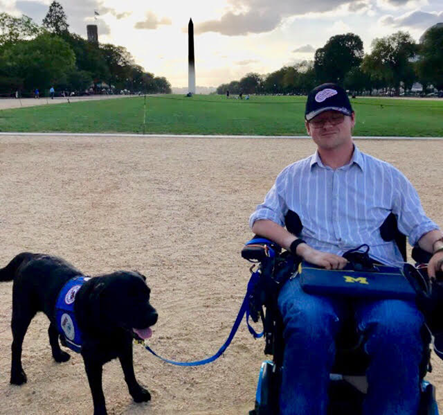Regional Champion Spotlight: James Murtha Part 1 - Reeve Foundation
 James Murtha has been a Reeve Foundation Regional Champion for four years and first connected with the Foundation not long after he sustained a C4 incomplete spinal cord injury in 2014. He works from home as a telehealth mental health counselor in Michigan and has contributed to numerous advocacy efforts with the Reeve Foundation. Through his efforts, the Foundation nominated him to serve on the first-ever RAISE Family Caregiving Advisory Council (FCAC) as the only wheelchair user.
James Murtha has been a Reeve Foundation Regional Champion for four years and first connected with the Foundation not long after he sustained a C4 incomplete spinal cord injury in 2014. He works from home as a telehealth mental health counselor in Michigan and has contributed to numerous advocacy efforts with the Reeve Foundation. Through his efforts, the Foundation nominated him to serve on the first-ever RAISE Family Caregiving Advisory Council (FCAC) as the only wheelchair user.
After three years of service and with the release of the National Strategy to Support Family Caregivers, James answered some questions about his experience and the work he completed. The Reeve Foundation thanks James for his service to the FCAC and hopes to see more actions taken to address caregiver shortages and increase support for care recipients and agencies across the country.
What do you value about being a member of the RAISE Family Caregivers Advisory Council?
This was an opportunity to bring caregiver issues that have been advocated for decades right to the desks of members of Congress. Our legislators have been presented with a blueprint for many of the issues faced by caregivers nationwide and now have recommendations for addressing them. I valued all the input from my fellow council members.
Since I joined the Reeve Foundation’s Regional Champions Program, it has presented me with many opportunities to effect change in my community, including being nominated to serve on this Council. I would have never dreamed that by joining this program, it would lead to something like this. If you are thinking about getting involved with Reeve’s advocacy efforts, please reach out to their Public Policy and Advocacy Department. You never know where you will end up.
What changes would you like to see in the direct care workforce? Have shortages of this workforce affected you?
I would like to see better pay and an increase in the base-level minimum wage rates for caregivers, including better reimbursement rates for home care companies, but not at the expense of how many hours are granted to care recipients. I don’t want to see an increase in wage compensation for direct care workers but a decrease in hours of support to people who need them. This is a key component.
After my injury, I only found two direct care companies that could assist me. When I returned to my apartment, the caregiving company I had scheduled just quit, leaving me with no assistance. They canceled because they didn’t have the employees to do all the routine care. I was left with nothing, and my ex-girlfriend, who was living with me at the time, had to take on all the responsibilities of caregiving.
As we all know, caregivers can become burnt out, which is what happened to her mentally and physically. This forced me to revert to living with my parents up north in rural Michigan. There were very few homecare companies both in the Ann Arbor area that worked with the Michigan Department of Health and Human Services (DHHS) and where my parents lived due to low reimbursement rates. These rates are impractical for sustaining a business. Homecare companies are basically working for charity.
The problem with low reimbursement rates is it prohibits sustaining a healthy business model. Home care companies don’t want to be paid more. They need to be paid more to survive, not just break even, or lose profit. This is an ongoing issue for anyone who is living with a spinal cord injury in rural areas of the country.
Check out part two of James Murtha’s blog about his experience serving on the FCAC.
If you are interested in joining our efforts, sign up to receive advocacy updates or contact Gerard Arnum, our Grassroots Advocacy Manager, at garnum@christopherreeve.org.
Join Our Movement
What started as an idea has become a national movement. With your support, we can influence policy and inspire lasting change.
Become an Advocate